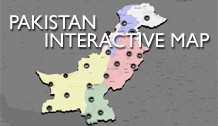A stable, prosperous, and democratic Pakistan that plays a constructive role in the region will remain in the long-term interest of U.S. national security interest. We continue to engage with Pakistan through bilateral cooperation and robust civilian and security assistance, which allows us to work jointly on issues that are important to both the United States and Pakistan: energy, economic growth, resilience, education, and health.
An array of partnerships with the Government of Pakistan, the private sector, and Pakistani civil society helps ensure that assistance programs are aligned with local priorities and build local capacity. USAID seeks to develop transformational partnerships and practices, as well as legacy institutions, to ensure that the impact of our assistance is sustained beyond the implementation period of our programs.
Over the past decade, the United States, through USAID, has given Pakistan nearly $7.7 billion of funding. Pakistan remains one of America’s largest recipients of foreign assistance, a sign of our long-term partnership and commitment.
USAID’s programs in Pakistan focus on five key areas: energy, economic growth, resilience, education, and health. All of our efforts in these five sectors incorporate the cross-cutting themes of gender equality and good governance. Learn more about USAID’s current programs through our Interactive Map.
ENERGY
To alleviate Pakistan’s energy challenges, USAID helps to increase energy production, improve energy efficiency, and promote power sector reforms. USAID also continues to strengthen governance of power sector institutions, develop new policies to rationalize pricing, support tariff reforms, and assist efforts by the Government of Pakistan to reduce subsidies. In addition, USAID has supported the Government of Pakistan’s efforts to increase its supply of natural gas, both from LNG sources and from shale gas.
ECONOMIC GROWTH AND AGRICULTURE
USAID, in collaboration with its local partners, is working to increase incomes and employment throughout Pakistan, nurture competitive enterprises and regional trade, and create rewarding business opportunities, especially for women. USAID’s activities focus on private sector development, including support for small and medium-sized enterprises, especially in agriculture and related industries. USAID helps to boost Pakistan’s agricultural productivity by increasing irrigation and introducing improved technologies and water management practices.
RESILIENCE
USAID’s activities support Pakistan’s efforts to improve governance, deliver essential services, and expand economic opportunity in unstable areas. USAID continues to work with the Government of Pakistan to deliver drinking water systems, improve irrigation, rehabilitate schools, build or rehabilitate roads and highways, and renovate power grids. USAID is also helping to rebuild communities ravaged by conflict and natural disasters through our support for the World Food Programme and the work of USAID’s Office of Disaster Assistance.
EDUCATION
USAID works in close collaboration with the federal and provincial governments to improve early grade reading, introduce policy reforms to ensure sustainability of U.S. government-supported initiatives, and build or rehabilitate schools throughout the country. The United States also supports the development of university degree programs for future teachers and provides scholarships to enable thousands of students to enroll in institutes of higher education throughout Pakistan.
HEALTH
USAID is working in partnership with the public and private sectors to improve the quality and expand the reach of health care services. USAID is committed to saving the lives of women and children, strengthening families and communities, and helping develop a healthy workforce.
GENDER EQUALITY AND FEMALE EMPOWERMENT
USAID is working to narrow the gaps between men and women to promote a more prosperous, stable society in Pakistan. In Pakistan, USAID is committed to increasing opportunities for women’s participation in the labor force, expanding girls’ access to quality education, improving maternal and child health, and promoting women’s political, economic, and social rights.









Comment
Make a general inquiry or suggest an improvement.